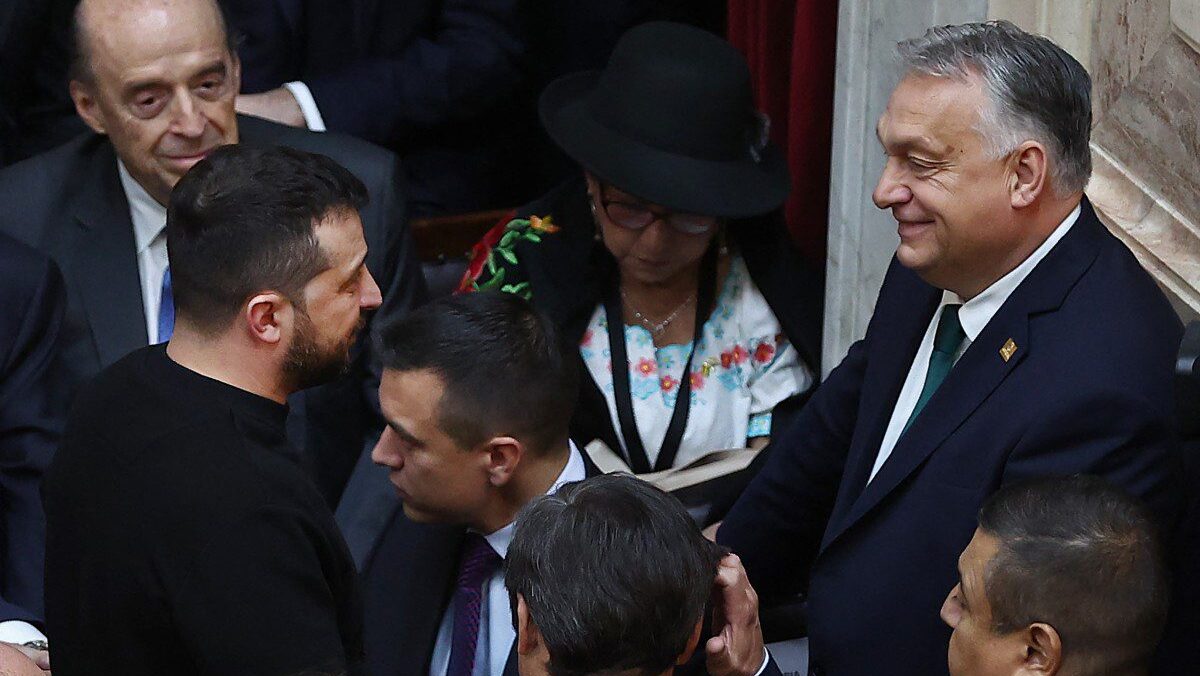
Photo: ALEJANDRO PAGNI / AFP
Seventeen percent of the European Union’s joint budget would flow directly to Ukraine if it were given EU membership, according to a report released on Monday, December 11th by the German Economic Institute. Under the EU’s current seven-year budget, that 17% would amount to €190 billion: around €70 to €90 billion would come from the common agricultural policy (CAP) funding, another €50 to €70 billion from the cohesion funds, with the aim of supporting Ukraine’s frail economy. This means almost all other EU member states would become net contributors, with Ukraine becoming the main net beneficiary of the EU.
The question of course is, as the report points out, what kind of Ukraine would join the EU: how large would its territory be and how many people would live in it following a potential peace deal with Russia? The only current EU member state that has pointed out the obvious is Hungary: Ukraine is still at war and therefore cannot start accession negotiations with the EU.
Hungarian Prime Minister Viktor Orbán is adamant that his country will block any attempts to approve the start of entry negotiations or release new funds for Ukraine at the summit of EU leaders this Thursday and Friday, December 14-15. According to diplomats speaking to Politico, an attempt to find a solution on the matter at the EU ambassadors’ special meeting on Sunday failed; Hungary is not budging. Any decision to proceed has to be unanimous.
Hungary has declined to send weapons to Ukraine and has been critical of EU sanctions against Russia, instead calling for peace talks to begin. The Orbán government has also made it clear it would veto Ukraine’s EU or NATO accession until the rights of the ethnic Hungarian minority in Ukraine are being abused. Orbán has also said Ukraine is too corrupt and not ready to join the EU.
While Hungary has welcomed hundreds of thousands of Ukrainian refugees and sent humanitarian aid to its neighbour, it is upset with hostile moves by Ukraine such as a lawsuit against Central European nations—including Hungary—that have banned the imports of Ukrainian grain to protect their own farmers. It is no wonder that, according to a recent opinion poll by the Hungarian Századvég Institute, 72% of Hungarians oppose Ukraine’s membership of the EU—up 9% points from a similar survey in September.
According to the Hungarian Prime Minister’s press chief, the topic of Ukraine’s entry negotiations came up during Orbán’s short but intense conversation with Ukrainian President Volodymyr Zelensky on Sunday, when the two spoke for about twenty seconds—captured by cameras—on the sidelines of the inauguration of the new Argentinian President, Javier Milei.
No sé qué le habrá dicho Zelensky a #Orban 🇭🇺, pero espero que le haya dejado una cosa clara: mientras no mejore la situación de la minoría húngara en Ucrania (#Transcarpathia) no habrá concesión alguna.
— Filosofía Política (@FilosofiaPolti) December 10, 2023
Asimismo, 🇺🇦 no cumple los requisitos para entrar en la UE 🇪🇺 o la OTAN 🌐. pic.twitter.com/BIm92nVN86
Президент Зеленський напередодні ключового саміту лідерів ЄС, який погрожує зірвати Віктор Орбан, коротко поспілкувався з прем’єр-міністром Угорщини.
— NV (@tweetsNV) December 10, 2023
Це відбулося на церемонії інавгурації новообраного президента Аргентини pic.twitter.com/1UhIOObk7F
After the rare meeting, Zelensky posted a video in which he said he had “a highly straightforward conversation” with Orbán, “focused on our European affairs.”
Viktor Orbán previously wrote in a letter to Charles Michel, President of the European Council, that an “urgent discussion” is needed on the European Union’s overall strategy on Ukraine. But it is not just Orbán who is weary of the continuous funding of Ukraine, with the war at a stalemate and no end in sight. As we previously reported, the new Slovakian government is also calling for peace talks, while larger countries, such as Germany, are not committed to the long-term funding of the war.
Volodymyr Zelensky will also feel the pressure in the United States where he is set to meet President Joe Biden on Tuesday. Biden and Zelensky “will discuss Ukraine’s urgent needs” as it fights off a Russian invasion, and “the vital importance of the United States’ continued support at this critical moment,” White House Press Secretary Karine Jean-Pierre said in a statement. But Republicans are unenthusiastic regarding further supporting Ukraine and have blocked funds until their request for beefed-up security on the borders with Mexico to stop illegal migrants is fulfilled by the White House.
Senator J.D. Vance, a close ally of former U.S. President Donald Trump, said he opposes a “blank cheque” for Ukraine. Quoted by AFP, he said:
You need to articulate what the ambition is. What is $61 billion going to accomplish that $100 billion hasn’t? What’s in America’s best interest is to accept Ukraine is going to have to cede some territory to the Russians and we need to bring the war to a close.”
Ukraine’s offensive has employed billions of dollars worth of Western weapons, but the front lines have barely shifted in more than a year and Russian attacks along the front have intensified.
Nearly half of American voters think the United States is spending too much on aid for Ukraine, according to a poll by the Financial Times and Michigan Ross: 48% believe their country is spending “too much” in military and financial aid, compared with 27% who said Washington was spending the “right amount” and 11% who said the U.S. was not spending enough.
